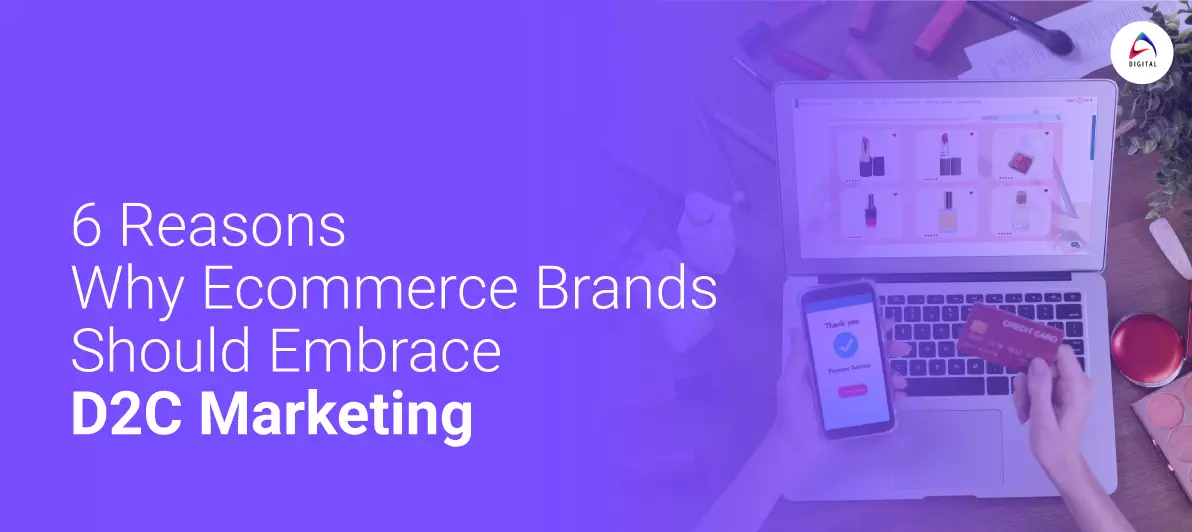Ecommerce Growth: 6 Reasons to Embrace D2C Marketing


In today’s competitive market, consumer brands are increasingly looking to establish direct relationships with their customers. This approach helps them gain deeper insights into consumer needs, maintain control over their brand experience, and differentiate their products or services. Additionally, it drives sales and enhances brand loyalty.
By continuously improving products, reducing overhead costs, and eliminating intermediaries, brands can significantly increase their profit margins. These benefits highlight the importance of direct-to-consumer (D2C) ecommerce. If you own an ecommerce business, consider these compelling reasons to adopt D2C marketing. But first, let’s get a quick overview of D2C from a leading digital marketing agency in Boston.
What is Direct-to-Consumer Ecommerce?
D2C is a model where a brand manufactures, markets, and distributes its own products without intermediaries. Typically, a D2C brand ships directly to customers, partners with retail locations, or operates pop-up shops.
The D2C approach focuses on a limited product range and often uses a subscription-based model. By removing additional parties from the sales process, brands can reduce costs, connect directly with consumers, and provide a seamless brand experience. This customer-first approach leverages digital marketing strategies, influencer power, and word-of-mouth.
A smaller product range allows brands to perfect both their products and sales funnel based on data-driven feedback. They can target the right market through precise marketing, guiding customers through decision-making and conversion.
Key Advantages of Adopting the D2C Business Model
Compared to traditional retail, direct-to-consumer ecommerce offers several advantages:
Increased Sales
Every business aims to boost sales, and D2C enables brands to achieve this. D2C companies can rely on their online portals or collaborate with retailers through a dedicated ecommerce website while maintaining a separate revenue stream. This model allows brands to increase profits by upselling and cross-selling their products.
Brands can sell directly to customers through their websites, and if they have the resources, they can offer bulk items from other suppliers. Reach out to ecommerce marketing experts for unique strategies to multiply your sales.
Reduced Dependency on Retail Partners
The dominance of online and offline retail stores squeezes manufacturers’ margins. As more physical retailers close, there is less shelf space for brands, reducing opportunities to reach end consumers. D2C is a way to counter this dependency.
Enhanced Consumer Engagement
In traditional brick-and-mortar models, manufacturers struggle to directly connect with their target market and gather feedback to improve products and strategies. Through D2C ecommerce, manufacturers can interact 1:1 with customers. This direct communication allows brands to identify customer needs through informative interactions rather than relying on fragmented data from retailers.
Broader Product Range
Retail stores rarely showcase a brand’s entire product catalog, focusing instead on items likely to generate regular sales. By managing their own online ecommerce store, manufacturers can expand their product range as needed. This approach is further enhanced by comprehensive product descriptions, images, and videos that retailers may not provide. Share your ecommerce needs with an ecommerce website development company to create a premium website showcasing all your products.
Increased Loyalty
Many buyers find it more rewarding and loyal to purchase from D2C brands rather than traditional retailers. This loyalty stems from two factors:
- D2C brands have better control over their customer experience.
- D2C brands manage their brand reputation more effectively. The experience and perception of the brand are linked to customer loyalty and interest.
By embracing D2C ecommerce, brands can build stronger customer bases with less complexity and a more straightforward supply-demand system.
Easier Omnichannel Experiences
Omnichannel marketing, as opposed to single-channel marketing, can significantly increase purchase frequency. D2C companies can provide a consistent brand experience across all touchpoints, managing production chains and communication channels at every step. This advantage is something traditional retailers find challenging to achieve due to their diverse and often fragmented platforms.
Given the rapidly changing consumer behavior, brands need to act swiftly to connect with their customers online. Every manufacturer or brand can benefit from D2C as a significant step forward. However, it’s crucial to develop effective online retail strategies, retention plans, and manage customer acquisition costs.
So, what are you waiting for? Connect with Aarna Digital, an ecommerce digital marketing agency in Newton, for tailored ecommerce website design services. Our team of experts can develop your store, brainstorm exclusive D2C marketing strategies for your business, and help you scale to success.
